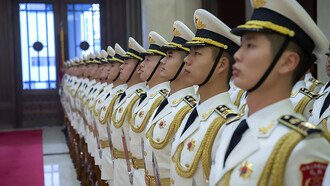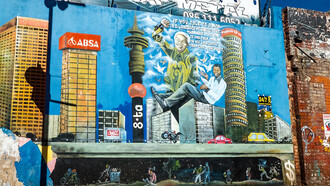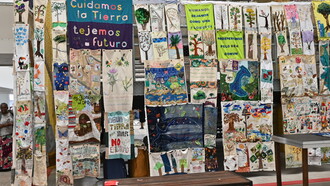The United States has long used democracy as a tool and a weapon to undermine democracy in the name of democracy, to incite division and confrontation and to meddle in other countries’ internal affairs, causing catastrophic consequences.
(Ministry of Foreign Affairs of the People’s Republic of China, 2022)
Much speculation as well as forthright disinformation exists regarding the Maidan uprising in Kyiv, the capital city of Ukraine, supposedly in the name of democracy and dignity, during late 2013 and early 2014. It peaked between February 18 and 20. The Maidan protests concluded with the expulsion of the democratically elected president Viktor Yanukovych on February 21, followed by the suspension of the national assembly on February 22, 2014.
At the end of the Orange Revolution in 2005 Victor Yushchenko was declared the official winner of the presidential election. He wanted to turn Ukraine towards the West, specifically towards the European Union and NATO. In 2010 he lost the presidency to the pro-Russian Yanukovych, who presided over Ukraine until his violent overthrow by the Maidan protests. Although he had campaigned for an association with Europe in the run-up to the presidential election he postponed the signing of an association agreement with the EU in November 2013. Ukrainian academics agree that his decision was a wise one since an association with the EU was tied up with conditions that implied a deterioration of the socioeconomic situation for the majority of the population. Few – if any – of Ukraine's industries would gain from the free-trade provisions that formed part of the association agreement. Rather it would mean intensified competition for them, and the loss of many jobs. The terms of the IMF credit that the government was negotiating at the same time also played a role: the IMF demanded a rise in gas consumption prices, wage freezes, and significant budget cuts which form part of the traditional IMF austerity package.1
The suspension of the Association Agreement resulted in a spontaneous outburst of demonstrations in central Kyiv. In the beginning, the protests mostly consisted of middle-class individuals and students residing in Kyiv driven by the ’European dream’, offering hope of a better society which continuously had been the message presented by USA-based NGOs working with civil society groups.
Polls undertaken during the month of November 2013 show that Ukraine was quite evenly split about the Association Agreement with the EU. 40 % was for and 40 percent supported an agreement with the Russian-led Eurasian Customs Union.
The argument
Given the involvement of US and Western-backed organizations, which had been active in the area of formation and training of civil society since the fall of the soviet empire, it is reasonable to suppose that these institutions, financed by Soros’ Open Society Foundation and the US Government through NED, contributed significantly to the preparation of a fertile ground for the final 'coup de grace' undertaken by armed members of right-wing groups, possibly with the involvement of foreign mercenary snipers, perhaps even recruited and financed by foreign intelligence services.
One key argument to be corroborated in this paper is that the Maidan protests and the resulting fall of President Yanukovych are unlikely to have occurred in the absence of massive establishments of civil society groups, critical to an association with Russia’s Eurasian Customs Union. More than 30 years of daily awareness building did not leave Ukraine untouched by Western values, although the final result was the demolition of democracy with the fall of the elected government.
In this article, we will take a closer look mainly at two leading US-based institutions, which aimed explicitly at developing a Ukrainian civil society that would work for an association with the European Union. Their financing of the formation of civil society groups and their subsequent training of individuals from these groups constituted a major cause for the Maidan protests.
Had more normal conditions prevailed with no meddling of foreign NGOs, the suspension of the association agreement by the national assembly is unlikely to have provoked such resistance, as that which emerged on the Maidan between November 21, 2013, and February 21, 2014. Had this been the case, Yanukovych would in all probability have been able to continue with a second term in 2015. It can thus be asserted that the external agencies with home bases in the USA and Europe in the name of democracy contributed significantly to the fall of the democratically elected government. It is plausible to add that neither would Russia have been provoked to annex the Crimean peninsula, nor to invade Ukraine.
The American hand on the Maidan
The formation of civil society with a Western orientation, which had been under development since the independence of Ukraine in 1991 helps to understand why the first demonstrators on the Maidan were middle-class students. They had been able to obtain a Western education often thanks to scholarships provided by foreign sponsors and had developed a Western outlook in part formed by a Ukranian media network sponsored by the National Endowment for Democracy and Soros’ Open Society Foundation. Within a few weeks of the start of the protests, nationalist groups of the far right feared that the demonstrations would die out and lose their force with the result that the pro-Russian president would have his way. Unexpectedly, the nationalist parties, received support from the Americans, when Senator John McCain visited the demonstrations on the Maidan in December 2013. In a speech to the protesters, he was flanked by the leader of the Svoboda party, formerly named the Social-National Party of Ukraine. This party combines elements of ultra-nationalism with anti-communism and it often presents itself with symbols known from Nazi Germany.
By January 2014 the American network, NBC, informed its audience that "right-wing militia-type toughs are now one of the strongest factions leading Ukraine's protests." What was meant to be a revolution for democracy and liberal values ended up featuring ultra-nationalist chants from the 1930s and displayed fascist and white supremacist symbols, including the American Confederate flag. The appearance of McCain on the Maidan suggests that the American position was to get rid of the pro-Russian president at any price. From this time on the demonstrations increased in size and violence. It also spread to most major cities in Ukraine under the leadership of militant leaders of the right. From this time on, a coalition of right-wing organizations made plans on how to turn the protests to their advantage. Nothing less than the departure of the President would do, even if he had to be assassinated. France, Germany, and Russia had negotiated an agreement with the president, who had agreed to a return to the 2004 constitution and hold a new election within 2014. This was agreed upon by the opposition in the national assembly but was fiercely rejected by leaders of the far right who now, with the help of McCain, were in full control of the Maidan protests. A massacre was being planned and perhaps with foreign support. Beginning on February 18, snipers killed a substantial number of demonstrators, with the single largest number killed on February 20. In total 108 protesters and 13 police officers had been killed during these two days by snipers.
An investigation undertaken by a researcher from the University of Ottawa suggests with firm evidence that the killings were undertaken by snipers strategically placed at buildings controlled by the extreme right. However, nobody has formally taken responsibility for the killings, just as nobody has been able to provide evidence to disprove the conclusions arrived at by Ottawa University. The massacres have been given little attention in Western mainstream media. One must therefore accept the findings as valid until evidence is submitted, which will prove them wrong. Official investigations undertaken as late as 2021 were thrown out of court since the evidence provided was not accepted by the Ukrainian authorities. The current president, Zelenski, has refused to undertake further investigations, although some TV stations in Germany, Italy, Israel, the USA, and Russia reported that the Ukrainian government investigation was manipulated.2 It is still a mystery who was behind this violent overthrow of the democratically elected Ukrainian government, although the current president, Zelensky, supports the narrative that the ousted president Yanukovych had given the order to his police to shoot into the crowd. Given the history of the character of US involvement in regime change throughout the world, it cannot be ruled out that the snipers were financed and organized by the US. President Yanukovych fled to Russia on the evening of February 21 to save his own life. A UN report from 2019 raised concerns about the authorities' genuine intention to ensure accountability and justice for victims.
US democracy promotion
Since the early 1990s, the National Endowment for Democracy (NED) and Soros Open Society Foundation were given a free hand to operate in Ukraine. These institutions, with the help of media and journalists financed and trained by them, bombarded the local populace with messages of democracy and freedom. The efforts of these two organizations led to the establishment of civil society organizations throughout Ukraine. Once established, hundreds of civil society groups received massive support from EU-based organizations, as well as from USAID and other North American organizations. It is difficult to measure the exact importance of events played by these two organizations but their role in the overthrow of the democratically elected government and its president cannot be ignored. This context helps us understand the importance of events on Maidan Square in Kyiv for the ongoing war between the US/NATO financed war, carried out by Ukraine's armed forces against the Russian invaders.3
National endowment for democracy
In the recent past, the CIA has worked through many fronts to implement covert operations, often to unseat democratically elected governments, as was done in Chile with the killing of the democratically elected President Allende. A similar story can be told from Iran, Guatemala, Nicaragua, and numerous other countries. This way of operating gave the CIA a very bad reputation. Therefore President Reagan decided to change this by the creation of the NED in 1983. NED has become one of the key instruments of promoting US foreign policy through ‘democracy promotion’. On its official website, it reads that “The Endowment is guided by the belief that freedom is a universal human aspiration that can be realized through the development of democratic institutions, procedures, and values”.
NED informs on its website that it is a unique organization. It “is an independent, nonprofit foundation dedicated to the growth and strengthening of democratic institutions around the world. Each year, NED makes more than 2000 grants to support the projects of non-governmental groups abroad who are working for democratic goals in more than 100 countries.… has remained on the leading edge of democratic struggles everywhere while evolving into a multifaceted institution that is a hub of activity, resources and intellectual exchange for activists, practitioners and scholars of democracy the world over.” Ukraine is just one of the many countries, which has been selected for regime change by the USA. In its own words, NED is "A Unique Institution". It promotes itself by stating that its "non-governmental character gives it a flexibility that makes it possible to work in some of the world's most difficult circumstances and to respond quickly when there is an opportunity for political change. NED is dedicated to fostering the growth of a wide range of democratic institutions abroad, including political parties, trade unions, free markets, and business organizations, as well as the many elements of a vibrant civil society that ensure human rights, an independent media, and the rule of law". Although referring to itself as an NGO, its activities are fully financed by US taxpayers' money through a budget approved by the US Congress.
In Ukraine, NED has spent millions of dollars to support political parties, labor unions, and the media. Key recipients in Ukraine of NED's finances include youth organizations, the Independent Association of Broadcasters, and organizations that took responsibility for the development of awareness-raising materials for the promotion of human rights. NED financed as well activities for the monitoring of the election process. It supported the establishment of media organizations that were ready to take the lead from Western-oriented interest groups.4
US-sponsored revolutions
The results of NED’s activities became visible in 2004 with the Orange Revolution. It was a brilliantly conceived exercise "in Western branding and mass marketing" launched with the help of US consultancies, pollsters, and diplomats as well as with the active assistance of Western-funded external agencies, such as Soros Open Society foundations”.5 At the end of 2004, during the Orange Revolution, the United States offered 65 million US dollars to the Ukrainian opposition through NED. When massive anti-government demonstrations broke out in Ukraine in 2013, NED funded as many as 65 NGOs in the country, and even provided large funds to pay "wages" to every protester on the Maidan to ensure that this revolution would not fail. NED is said to have invested around 14 million US dollars in the demonstrations alone, which finally led to the overthrow of President Yanukovych. This goal was only achieved thanks to very generous support from George Soros Open Society Foundations.
George Soros and the Open Society Foundation
George Soros, an American businessman with roots in Eastern Europe, was the first one to contribute to the development of civil societies in newly independent countries of the former communist block after the fall of the Soviet Union. His organizations were very active in Russia, but were banned there in November 2015, because the Russian government ”…. found that the activity of the Open Society Foundations represents a threat to the foundations of the constitutional system of the Russian Federation and the security of the state”.
George Soros was a student of the philosopher Karl Popper who inspired him to name his organization the Open Society Foundation, which aims to defend the values of capitalist democracies against those of totalitarian systems.6 Open Society Foundation has full government approval and receives occasionally grants from US government agencies to promote Soros’ collaboration with NED.7 Soros established in 1990 the International Renaissance Foundation (IRF) as a Ukrainian Foundation. Before the Russian invasion in 2022, IRF had satellite offices in four cities besides Kyiv. It employs more than 60 people. Through the platform of the International Renaissance Foundation, all efforts are made to direct the Ukrainian people towards closer ties and a formal agreement with the European Union and other Western organizations. Since the Orange Revolution in 2004, IRF mostly financed NGO projects that encourage European integration and strengthen civil society's impact on public policy.8 The division director of Open Society's Europe and Eurasia program declared that education has become a top priority, from kindergarten on up to higher education to scholarships. Libraries are a big focus, as well as the publishing of textbooks. Soros's foundations also contributed significantly to the information war against Russia.
Ukraine is not in NATO: NATO is in Ukraine
By 2014 there were more than 3,000-4,000 active and functional SCOs in Ukraine. Around 30 % of them focused on civic education and another 30 % on human rights, while 25 per cent addressed social issues and problems. Furthermore, by 2014 thousands of trade unions had been established.9 When the massacre came to a full blow on February 20, 2014, the masses accepted the explanation contrived by the far right stating that the pro-Russian president had ordered his police to kill civilians. This version of events corresponded with the anti-government views of most of the protesters as well as the anti-Russian narrative told by mainstream media in the West.
It has been claimed by some observers that a lack of understanding by foreign NGOs of the local context could lead to unintended consequences - a prophecy fulfilled with the outcome of the Maidan protest.10 US state officials in Kyiv were quick to take advantage of the fall of the government. They were seen to take an active part in the choosing of members to the new Government. Putin's reaction was to annex Crimea. The meddling of the US and EU in the internal affairs of Ukraine only increased as a result of the Maidan protests. In 2016 President Obama redoubled American military aid and appointed John Abizaid, the commanding general in Iraq during the early years of its occupation, as senior adviser to Ukraine's Minister of Defense for five years.11 His designation prompted the Professor emeritus at the Princeton School of Public and International Affairs, Stephen Kotkin, to note that while Ukraine is not in NATO, but NATO is in Ukraine. 12During the present government, presided by Zelenski, we note an increased strengthening of the control of the US and NATO over Ukraine’s operations against Russia. As a former comedian, President Zelenski plays the role of a marionette of the US and NATO extremely well.
Civil society: a tool for democracy promotion
Essentially, the National Endowment for Democracy and Soros Open Society Foundation through its Ukrainian-based International Renaissance Foundation continue to work for the objective of foreign policies of the US and its European partners in Ukraine. Leading up to the expected time of signing the association agreement, the EU launched a range of new instruments to support civil society. Independently of Soros’ IRF, the EU launched a series of instruments between 2011 – 2013, which encouraged SCOs to engage in reforms of the media.
The EU created in 2013 its version of NED called the European Endowment for Democracy, which financed media, social activism, and training of journalists. The aim was to establish and consolidate civil organizations which are the single most important tool through which the West exerts its ideological influence and ensures control and leadership.13 Once civil society groups have accepted the Western ideology and accepted to spread it via media and the education system, there is a good chance that the political system will work for the implementation of enduring political systems open to a Western liberal market policy.
Democracy: a tool for the promotion of western dominance
Brezinsky, the former US national security advisor, answered as to why the US takes such a keen interest in the promotion of its version of democracy in Ukraine. Without Ukraine, Russia ceases to be a Eurasian empire which threatens global dominance by the USA. Brzezinski arguesthat with Ukraine in the orbit of Washington, the US would have given a fatal blow to Russia.14 Without control and dominance of Ukraine, Russia risks losing its control and influence over other former Soviet republics in Asia. It is difficult to verify Brzezinski's argument. Implicitly, he informs us that the US and European democracy promotion mainly serves Western interests and not the welfare of the people in the country being targeted by NED and Soros. Democracy promotion in the name of freedom and human rights is thus a smokescreen to promote and achieve Western interests, especially, economic ones thus bolstering global leadership and dominance of the USA.
Seeking alternative democracy models
Although the two organizations focused upon in this essay have received plenty of support from the EU and other US-based institutions during the last thirty years, it is doubtful that they have succeeded in turning civil society around to the principles of Western values and that they ever will succeed. The US and its European Allies forget that democracy promotion based upon Western values is not universal, as it is professed. The American and European concept of democracy rests on individual freedom, and cannot therefore automatically be imposed upon countries with a more community-based freedom culture. Russia, China, and numerous other countries, in Africa, Asia, and South America do not fully adhere to the Western-defined democracy which has produced a world where the richest one per cent of the global population owns about half of the world's wealth.
It is often forgotten that there is no necessary connection between individual liberty and democratic rule, neither between individual freedom and economic growth and welfare for the people. Individual liberty and economic development are not incompatible with some kind of autocratic government nor with the absence of self-government. The preservation of freedom depends not on who wields authority, but merely on the degree of authority applied. When determining the kind of support required to assist a nation in improving the socioeconomic conditions of its people, it is worthwhile to remember the success of the Chinese democracy model. The ultimate test of the importance of any political system should always be decided on the results of an evaluation of the benefits and welfare it generates for the people. Since the 1970s China has succeeded in bringing more than 700 million people out of extreme poverty.
References
1 From Interview with Volodymyr Ishchenko (Kyiv-based sociologist), 16 June 2014, published in New Left Review, no 87.
2 The Maidan Massacre in Ukraine: Revelations from Trials and Investigation, by Ivan Katchanovski, University of Ottawa, November 29, 2012.
3 A High Stakes Gamble: U.S. Assistance for Ukraine’s Pro-Democracy Movement in Journal of International Affairs, Vol. 71, no. 1, by David Korenke.
4 High Stakes Gamble: U.S. Assistance for Ukraine's Pro-democracy movement in Journal of International Affairs, vol 71, no.1 (Fall/Winter 2017) by Davud Korenke.
5 The Guardian: US campaign behind the turmoil in Kyiv, by Ian Tarynors, 26 Nov 2004.
6 Karl Popper is the author of The Open Society and its Enemies.
7 Wikipedia, August 2023, on George Soros.
8 Assessing Democracy Assistance, Ukraine, by Natalia Shapovalova, 2010.
9 Ukrainian civil society from the Orange Revolution to Euromaidan for a new social contract, by Iryna Solonenko. OSCE yearbook, 2014. Baden-Baden 2015.
10 Friend or foe? Foreign donors’ role in the formation of civil society in Ukraine, by Shevtsova, M. (2017) in socio.hu/index.php/so/article/view/761, Budapest.
11 An Avoidable War, by Susan Watkins in an editorial of New Lef Review 133/134.
12 Quoted from New Left Review 133/134.
13 Democracyendowment.eu/en.
14 The Grand Chessboard: American Primacy and its Geographic Imperatives, 1997, by Zbigniew Brzezinski.















